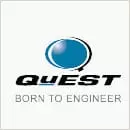QuEST Global was delighted to be part of the speaker panel at the 2014 GE Should Cost Summit held on September 11, 2014 at the GE Global Research Center, Niskayuna, NY, USA. The invitation-only event had over 80 participants from across GE and more than 20 external speakers from leading OEMs (Ford, John Deere), engineering services (QuEST), consulting / industry bodies (McKinsey, SAVE), academia (Ohio University, Penn State) and tool vendors (Boothroyd, aPriori, Siemens).
The all-day event at the picturesque GE Global Research campus in upstate New York witnessed experts sharing best practices in the field of Should Costing / Cost Modelling on:
– Integrating Cost Modeling into New Product Development
– Role of Analytics in Cost Management and Design to Cost
– Implementation of Should Cost initiatives across the business
– Should Costing automation tools – Trends & Future
QuEST was represented by our Supply Chain practice head, Dinesh Sekar (Associate Vice President – Supply Chain). Dinesh has 17 years of supply chain experience during which he has driven number of cost reduction programs and delivered $100+M in savings across Power Gen, Oil & Gas, and Aviation domains.
Dinesh led the topic Accelerating Cost Reduction Programs – Leveraging Should Cost Methodology. The QuEST session focused on importance of integrating Should Costing methods into the new product development process, criticality of having Integrated Project teams that include Supply Chain representatives, and driving simplicity into the Cost Management process.
Dinesh went on to share QuEST best practices on running “Mixed Capability Teams” to drive efficiency and accuracy into the Should Costing process and emphasized the role of Manufacturing Engineers in the Should Costing process. The presentation invoked exciting discussions around how to effectively engage extended supply chain in the product development process, manage supplier negotiations, criticality of manufacturing engineers, how service providers like QuEST can help accelerate the process.
As a closure to the QuEST session, summit attendees were provided the below recommendations:
– Develop Should Costing CoE at the enterprise level – Central Shared Service
– Engage Suppliers in Should Costing efforts – Gain share agreements
– Strategic Partnership with Engineering Service Organizations – Risk/Reward Agreements
The summit provided an excellent opportunity for the 100+ Cost Engineering zealots to share their day-to-day experiences in their pursuit of “Design to Cost” as well as “Drive Cost Out”.
QuEST provides end-to-end Cost Engineering solutions catering to global OEMs across Aerospace, Power Generation, Oil & Gas and Transportation verticals. QuEST’s capability includes Should Costing, Cost Estimation, VA/VE, Product Redesign, Manufacturing Process Improvement, Spend Management and Supplier Development.
